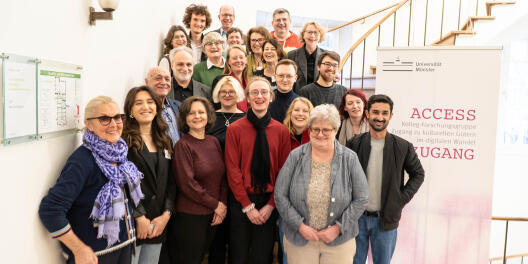

Photos

From 4 to 6 April 2024, the Centre for Advanced Study hosted the workshop “Protecting and accessing cultural goods in wartime – Case Studies and Lessons from Armenia and Ukraine” (scientific organisation: Ruben Apressyan).
War not only threatens the lives and physical integrity of people; cultural goods are also at risk of damage and total loss during war. Protecting them in the event of war is an important task for every community, and digitalisation enables new forms and modes of preserving cultural goods or their blueprints that give people access to them in times of war and even more so afterwards. Based on examples and experiences from Armenia and Ukraine, the workshop discussed practical questions and ethical aspects of the protection of cultural goods during war.
The workshop is part of the research project “How to Deal with Cultural Goods in War and Post-war Times: An Ethical Analysis”– directed by Ruben Apressyan – as part of the Centre for Advanced Study “Access to Cultural Goods in Digital Change”, funded by the German Research Foundation (DFG).
The poster for the workshop can be downloaded here (PDF file).
INTERNATIONAL DOCUMENTS RELATED TO THE PROTECTION OF CULTURAL GOODS
UNESCO Conventions and Declarations
- Convention for the Protection of Cultural Property in the Event of Armed Conflict with Regulations for the Execution of the Convention (Hague Convention, 1954).
https://en.unesco.org/protecting-heritage/convention-and-protocols/1954-convention
- Convention on the Means of Prohibiting and Preventing the Illicit Import, Export and transfer of Ownership of Cultural Property (1970).
https://eca.state.gov/files/bureau/unesco01.pdf (pdf download)
- Convention for the Protection of the World Cultural and Natural Heritage (1972).
https://whc.unesco.org/en/conventiontext/
https://legal.un.org/avl/ha/ccpwcnh/ccpwcnh.html
- Convention on the Protection of the Underwater Cultural Heritage (2001).
https://unesdoc.unesco.org/ark:/48223/pf0000126065
- UNESCO Universal Declaration on Cultural Diversity (2001).
https://unesdoc.unesco.org/ark:/48223/pf0000127160
- UNESCO Declaration concerning the Intentional Destruction of Cultural Heritage (2003).
https://unesdoc.unesco.org/ark:/48223/pf0000133874
- Convention on the Protection and Promotion of the Diversity of Cultural Expressions (2005).
https://unesdoc.unesco.org/ark:/48223/pf0000142919
UN Resolutions
- UN HRC Resolution 33/20: “Cultural rights and the protection of cultural heritage” (2016).
https://documents.un.org/api/symbol/access?j=G1622755&t=pdf (pdf download)
- UN SC Resolution 2347 [on the illegal destruction of cultural heritage, in particular, objects and monuments and objects of religious purpose, as well as looting and illegal export of cultural property] (2017).
https://documents.un.org/api/symbol/access?j=N1707904&t=pdf (pdf download)
- UN HRC Resolution 37/17: “Cultural rights and the protection of cultural heritage” (2018).
https://documents.un.org/api/symbol/access?j=G1809981&t=pdf (pdf download)
UN Reports
- A/HRC/17/38. Report of the independent expert in the field of cultural rights, Farida Shaheed: “The right of access to and enjoyment of cultural heritage” (2011).
- A/HRC/31/59. Report of the Special Rapporteur (Karima Bennoune) in the field of cultural rights [On the intentional destruction of cultural heritage as a violation of human rights] (2016).
https://documents.un.org/api/symbol/access?j=G1601697&t=pdf (pdf download)
- A/HRC/71/317. Report of the Special Rapporteur (Karima Bennoune) in the field of cultural rights: “On the intentional destruction of cultural heritage as a violation of human rights” (2016).
https://www.concernedhistorians.org/content_files/file/to/354.pdf (pdf download)
- A/73/227. Report of the Special Rapporteur in the field of cultural rights: “Universality, cultural diversity and cultural rights” (2018).
https://documents.un.org/api/symbol/access?j=N1823765&t=pdf (pdf download)
Programme
The folder can be downloaded here (PDF file).
Thursday, 4 April 2024
Chair: Eberhard Ortland
10.00 am
Protecting and Accessing Cultural Goods in Wartime: Case Studies and Lessons from Armenia and Ukraine. A Short Introductory Note
Reinold Schmücker (Münster, GER)
10.15 am
Protecting Cultural Property: Normative Dispositions
Ruben Apressyan (Münster, GER)
11.15 am
Coffee Break
11.30 am
Safeguarding Cultural Goods in Wartime. Ethical Perspectives
Lukas Daum (Münster, GER)
12.30 pm
Lunch
02.00 pm
Protecting Cultural Heritage During the Wartime: Social-Philosophical Aspects
Marina Bykova (Raleigh, USA)
03.00 pm
Coffee break
03.30 pm
UNESCO’s Convention on Intangible Heritage and its Implications in Pakistan
Arslan Sheikh (Islamabad, PAK/Münster, GER)
04.30–05.00 pm
Discussion
07.00 pm
Dinner
Friday, 5 April 2024
Chair: Ursula Frohne
10.00 am
Lost Cultural Heritage in Russian-Ukrainian War: Cases and Tendencies
Mariya Rohozha (Kyiv, UKR)
11.00 am
Coffee Break
11.15 am
The SUCHO Ukrainian War Memes Archive: An International Effort in Preserving Intangible Cultural Heritage in Wartime
Anna Rakityanskya (Cambridge, USA)
12.15 pm
Lunch
02.00 pm
Digitalization of the Local Community: A Culture of Vigilance in Wartime Conditions
Olena Pavlova (Kyiv, UKR/Berlin, GER)
03.00 pm
Coffee Break
03.30 pm
Historical Technologies Destroyed by Russia: The Consequences of the Occupation of Crimea (via Zoom)
Denys Yashny (Kyiv, UKR)
04.30–05.00 pm
Discussion
07.00 pm
Dinner
Saturday, 6 April 2024
Chair: Maria Engelskirchen
10.00 am
Issues of Cultural Heritage Protection During the War: The Experience of monumentwatch.org Academic Platform
Hamlet Petrosyan (Yerevan, ARM)
11.00 am
Coffee Break
11.15 am
Refugee Heritage: Monuments, Museums and Private Collections in a New Reality
Haykuhi M. Muradyan (Yerevan, ARM)
12.15 pm
Lunch
01.45 pm
Signs, Symbols and Monuments in Armenian-Azerbaijani Conflict
Anush Safaryan (Yerevan, ARM)
02.45–03.00 pm
Protecting and Accessing Cultural Goods in Wartime: What’s Next? Closing Remarks
Ruben Apressyan (Münster, GER)











